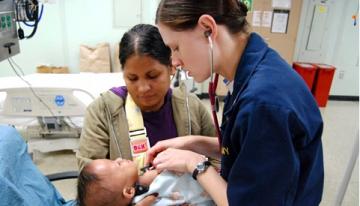The Master of Arts in Bioethics is a complementary degree program, rather than a terminal or professional degree, such as an MPH or MBA program. Therefore, our program has been crafted to work best for students who already have a graduate or professional degree, plan to pursue a professional degree program concurrently with our MA program (e.g., Nursing, Social Work, or Law) or otherwise have an established career in a health-related field. For more information about concurrent degree programs, see Graduate School Policy. This opportunity is open to all eligible persons regardless of race, sex or other identity.
Important Notice: Starting with the January 2025 application cycle, the department will only consider applications from Fellows sponsored by the Treuman Katz Center for Pediatric Bioethics and Palliative Care. Please check back with the department in Autumn 2026 if you are not eligible to apply under the current configuration. The department will be reviewing and redesigning its master’s program and anticipates reinstating broader admissions eligibility once that process is complete.
Application Requirements
-
Complete the Application for Graduate Study at the University of Washington (select Bioethics and Humanities Program) between December 1 and January 15
-
Submit transcripts for degrees earned
-
Submit a personal statement
-
Submit an essay in response to a specific case study (do not submit a writing sample)
-
Ensure three letters of recommendation are submitted by January 15
-
If you have questions about the application, please reach out to the Academic Program Manager at bhadvise@uw.edu
Admissions Timeline
- Mid-February: Admissions decisions are conveyed through Slate and are final
- Mid-April: If you have been admitted, you must accept, decline, or defer the offer and your admission decision is final
- Late-September: If you have been admitted and accepted, plan to attend orientation and begin your autumn coursework
 Our flexible two-year, in-residence program provides students with the foundational knowledge, skills, and experience to enrich their careers and broaden their competency in bioethics. The program offers training in research and clinical aspects of bioethics as well as empirical and normative methods of analysis. Students have the opportunity to study with diverse and well-respected faculty from the University of Washington, the Treuman Katz Pediatric Bioethics Center, and the Seattle Veteran’s Health Administration. Our program helps prepare students to teach, publish, and conduct research that incorporates bioethical analysis.
Our flexible two-year, in-residence program provides students with the foundational knowledge, skills, and experience to enrich their careers and broaden their competency in bioethics. The program offers training in research and clinical aspects of bioethics as well as empirical and normative methods of analysis. Students have the opportunity to study with diverse and well-respected faculty from the University of Washington, the Treuman Katz Pediatric Bioethics Center, and the Seattle Veteran’s Health Administration. Our program helps prepare students to teach, publish, and conduct research that incorporates bioethical analysis.













